Shakespeare and Interpretation, or
What You Will
Shakespeare and Interpretation, or
What You Will
Brayton Polka
UNIVERSITY OF DELAWARE PRESS
Newark
Published by University of Delaware Press
Co-published with The Rowman & Littlefield Publishing Group, Inc.
4501 Forbes Boulevard, Suite 200, Lanham, Maryland 20706
www.rowmanlittlefield.com
Estover Road, Plymouth PL6 7PY, United Kingdom
Copyright 2011 by Brayton Polka
All rights reserved. No part of this book may be reproduced in any form or by any electronic or mechanical means, including information storage and retrieval systems, without written permission from the publisher, except by a reviewer who may quote passages in a review.
British Library Cataloguing in Publication Information Available
Library of Congress Cataloging-in-Publication Data
Polka, Brayton.
Shakespeare and interpretation, or what you will / Brayton Polka.
p. cm.
Includes bibliographical references and index.
ISBN 978-1-61149-042-8 (cloth : alk. paper) ISBN 978-1-61149-043-5 (electronic)
Shakespeare, William, 15641616Criticism and interpretation. I. Title.
PR2976.P57 2011
822.3'3dc22 2011007986
 The paper used in this publication meets the minimum requirements of
The paper used in this publication meets the minimum requirements of
American National Standard for Information SciencesPermanence of Paper
for Printed Library Materials, ANSI/NISO Z39.48-1992.
Printed in the United States of America
Preface
Of the nine chapters that constitute my study the first is introductory. I devote it to showing that the concept of interpretation that we bring to the study of Shakespeares works is precisely that which they bring to us. The principle here is that we can interpret solely those textsin whatever medium, of whatever discoursewhich themselves contain the concept of interpretation. Interpretation is not something that we do to a text, external to its textuality, to its content, to its story, to its values. Rather, interpretation constitutes the very values by which we test, examine, and interrogate the text and the very same values by which the text tests, examines, and interrogates us. It then emerges that there are texts that cannot be interpreted. There are texts that do not contain, or bear witness to, the values that constitute interpretation. I refer here, as relevant to my study, to the (pagan) works of Roman and Greek antiquity, above all, the tragedies of Aeschylus, Sophocles, and Euripides. Of the many issues that consequently arise here, two are paramount. The first is to distinguish between Greek tragedy and Shakespearean tragedy, between the values that are central to each. As we learn from Juliet and Rushdie, we must not confuse the accident of a family namehere tragedywith necessary existence. While the name tragedy is common to both the ancients and Shakespeare, ancient (pagan) tragedy contains no concept of the necessary existence of interpretation as love of neighbor.
We have now arrived at our second issue. How, then, are we to understand Shakespeares Roman and Greek plays? I refer to those plays whose content is constituted by Roman and Greek story: Titus Andronicus , Julius Caesar , Antony and Cleopatra , Coriolanus , Timon of Athens , and Troilus and Cressida , together with The Rape of Lucrece . These works present us with an exquisite paradox. As modern (biblical)post-classical, if you willthey cannot not contain, and so they do contain, the principle of interpretation that constitutes all of Shakespeares plays. Yet, as classical in content, they cannot and do not contain the principle of interpretation. Why Shakespeare wrote these works, that is, how we are to understand them or what it is that we are to get out of them makes them among the most challenging of his works to comprehend. It is little wonder that they have largely defied critical understanding, whether on the part of critics or in stage production. They provide an especially acute test for my concept of interpretation.
The seven chapters that follow the Introduction constitute the heart of my book. I read seven individual plays. This study is not a Shakespeare survey. I find that it is only when we exactingly ask why and how it is that characters bespeak themselves in the plays that we can truly appreciate the extraordinary self-consciousness with which Shakespeare endows them. The text of plays is uniquely constituted, except for brief stage directions, by the speeches that their various characters make (including, for example, the Chorus in Romeo and Juliet and Henry V , Time as the chorus in The Winters Tale , and Gower as the chorus in Pericles ). There is no independent narrative. The playwright is nowhere present in his plays, yet he is omnipresent. Of the seven plays I study here I could have chosen others, with the exception, doubtlessly, of Hamlet . To gain an adequate conception of the prince of Denmark must always be, I think, the ultimate test of ones interpretive principles. Given the centrality of Hamlet to my study, I thought it important to read other major tragedies of Shakespeare, in this case, Macbeth and Othello .
Because Shakespeares Roman and Greek plays are central to my study, as I indicated above, I read two of them. I chose Julius Caesar over the other Roman plays because it is particularly instructive to discern the fundamental differences between Brutus and Hamlet. I include Troilus and Cressida , both because it is surely the most famously misunderstood of all of Shakespeares plays and because, as Hamlets play, it is central to seeing why Hamlet has the player speak Virgils description of the scene in ancient Troy in which the clamor of Queen Hecuba, When she saw [the Greek warrior] Pyrrhus make malicious sport / In mincing with his sword the limbs of her husband, King Priam, would have made moist the fiery eyes of heaven. I also discuss The Rape of Lucrece as part of my examination of how Shakespeare, while imbuing the ancient scenes that he depicts with his own modern (biblical) consciousness, at the same time shows us that the consciousness of ancient figures is utterly different from our own.
An example of what we may call Shakespeares double(d)-consciousness (which is not to be confused with double-mindedness) is given in the passage from Julius Caesar that stands at the head of my study. After Cassius, Brutus, and the other defenders of republican (senatorial) values have killed Caesar and bathed their hands in his blood, Cassius indicates that their lofty scene will be acted over, / In states unborn and accents yet unknown! While Cassius effectively expresses a sense of the magnitude that their act of assassinating Caesar involves, at the same time two opposed perspectives on, or concepts of, history emerge in his speech. One perspective comes from within the Roman story and is consistent with it. Mark Antony and Octavius Caesar will view the assassins of Julius Caesar as conspirators; and it will then be Octavius who, after destroying, first, Cassius and Brutus, with Antonys aid, and, second, Antony, will reenact this lofty scene in which the republican state of Rome is reborn as the empire, with the emperor himself being reborn as the res publica , the republic or public thing. The other perspective, that of Shakespeare, is not Roman. His conception of ancient Rome is not republican in the sense either of Brutus or of Caesar (whether Julius or Augustus). Rather, Shakespeare reenacts the lofty scene of Caesars assassination within the historical perspective of modernity, the state of whose biblical consciousness was born outside of Rome and the accent of whose interpretive commitment to love of neighbor was unknown to the Romans.
To round out my study of Shakespeare I also include two of his wondrous comedies, Twelfth Night (earlier) and Alls Well That Ends Well (later). I regret not being able to treat in detail King Lear , Measure for Measure , the four late romances, the four major history plays ( Richard II , Henry IV 1 and 2 , and Henry V ), and so many other plays, not to mention the sonnets. I do, however, from time to time, call upon, as appropriate, key passages from plays other than the seven on which I concentrate in my study.

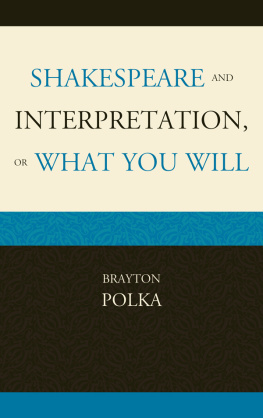
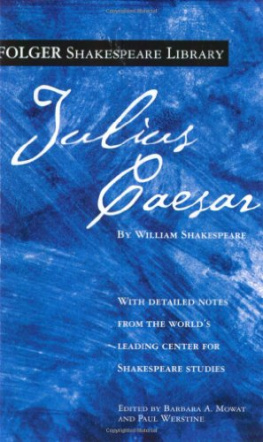

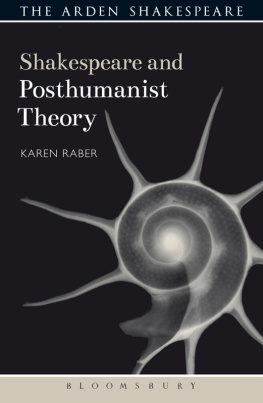

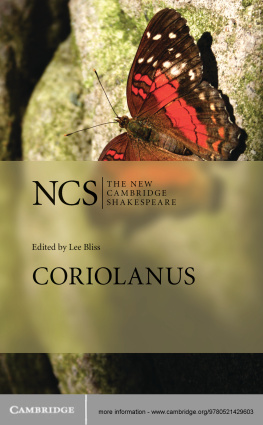
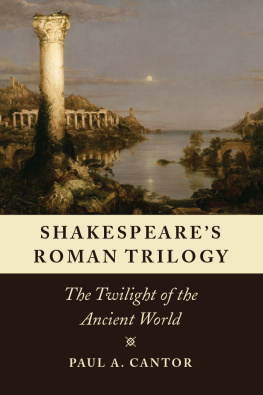

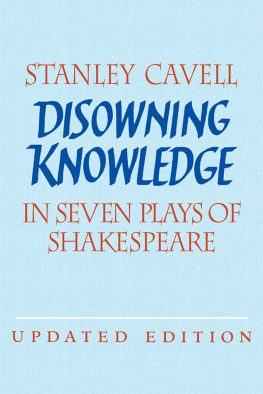

 The paper used in this publication meets the minimum requirements of
The paper used in this publication meets the minimum requirements of